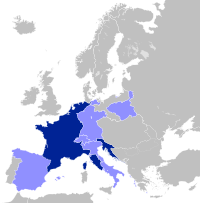Rhodanic Republic
Rhodanic Republic République Rhodanique | |||||||||
|---|---|---|---|---|---|---|---|---|---|
| 1802[1]–1810[2] | |||||||||
 | |||||||||
 | |||||||||
| Status | Client state of France | ||||||||
| Capital | Sion | ||||||||
| Government | Republic | ||||||||
| Historical era | Napoleonic Wars | ||||||||
• Separation from the Helvetic Republic | 28 August 1802[1] | ||||||||
• Annexation to the French Empire through decree | 13 December 1810[2] | ||||||||
| |||||||||
The Rhodanic Republic, also known as the Republic of Valais (French: République du Valais) or Vallais, was a sister republic of France that existed in the French-speaking part of Switzerland during the Napoleonic era, between 1802 and 1810, in the territory corresponding with the modern Swiss canton of Valais. It was named after the Latin name for the River Rhône, Rhodanus.
History[]
A Rhodanic Republic had already been envisaged in March 1798 by General Guillaume Brune, commander of the French troops in Switzerland, as one of three successor republics of the Old Swiss Confederacy (the other two being Tellgovie and the Helvetic). Brune's République rhodanique would have incorporated the present-day cantons of Vaud, Valais, Ticino, Fribourg and part of Bern (Oberland) with Lausanne as its capital.[3] The canton was to be divided into 17 administrative districts, each with a sous-prefet. However, this idea was put aside. In 1798, when the troops of General Napoleon Bonaparte invaded the Swiss Confederacy, the Frech-speaking population of the Lower Valais declared a Revolutionary République du Valais (March 16) which was swiftly incorporated (May 1) into the Helvetic Republic.
The Helvetic Republic served Napoleon's purposes well for some time, until it became ridden with internal strife and disputes and became unstable. At the same time, as First Consul Napoleon felt the need to better secure the passage from France to Italy through the strategic Simplon Pass in Valais, since the Battle of Marengo in 1800,[4] considering the difficulty and hardship of crossing the Alps through the Great St Bernard Pass, also in Valais. Though unwilingly, the Swiss authorities accepted the separation of Valais which was accomplished on 28 August 1802 (10 Fructidor, Year X), in a treaty signed in Sion and Bex between France, the Italian Republic, the Helvetic Republic and the now indepent Republic of Valais. The treaty's third article confirmed French defense and control over the Simplon Pass.[2]

Napoleon quickly ordered the development of the route which would connect Paris with Milan, but expansion was undertook slowly. On 1806 the road was officially opened despite not being complete yet.[2] François-René de Chateaubriand was appointed French minister to the Valais on November 1803, but as royalist resigned on March 1804 following the execution of the Duke of Enghien by the French authorities. Chateaubriand was replaced by Joseph Eschassériaux, who held the post from July 1804 to October 1806, the year he wrote a Lettre sur le Valais et sur les moeurs de ses habitants ("Letter on the Valais and on the manners of its inhabitants").[2]
Annexation by France[]
By an imperial decree of 12 November 1810, Napoleon united to the French Empire the territory of the Republic of Valais, under the name of the department of Simplon. In the decree he justified the annexation:
Considering that the Simplon Road, which unites the Empire to our Kingdom of Italy, is useful to more than sixty million men; that it cost our treasures in France and Italy more than eighteen million, an expense which would become useless if commerce could find there no convenience and perfect security;
That the Valais did not fulfill any of the engagements it had contracted when we had the work begun to open this great communication;
Wanting moreover to put an end to the anarchy which afflicts this country, and to cut short the abusive pretensions of sovereignty of a part of the population on the other.[2]
With the collapse the Empire, the department was occupied by Austrian troops in late December 1813.[5] On August 1815, the Valais entered the new Swiss Confederation as a canton.
References[]
- ^ The Editors of Encyclopaedia Britannica (April 9, 2013). "Valais". Encyclopædia Britannica. Encyclopædia Britannica, inc. Retrieved November 11, 2019.
- ^ Jump up to: a b c d e Czouz-Tornare, Alain-Jacques. "Quand le Valais était français". Fondation Napoléon (in French). Retrieved 2 June 2021.
- ^ Rhodanic Republic in German, French and Italian in the online Historical Dictionary of Switzerland.
- ^ "Il y a 200 ans - Le Valais". Fondation Napoléon. Retrieved 2 June 2021.
- ^ Arnold, Renato. "Simplon (département)". Historical Dictionary of Switzerland. Translated by Florence Piguet. Retrieved 13 February 2021.
- History of Valais
- Client states of the Napoleonic Wars
- 1802 establishments in Europe
- 1810 disestablishments in Europe
- Former republics
- Former countries
